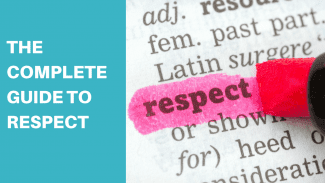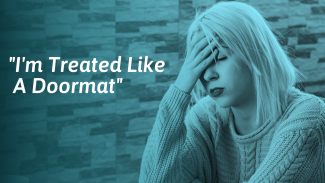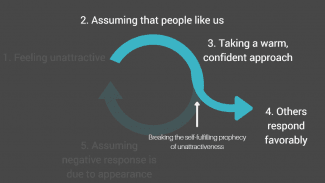Many of us assume that popular people are born with a special gift that enables them to make friends wherever they go. But you can become more popular at any age by developing your social skills and taking a more open, positive approach to people and life in general.
In this guide, you’ll learn how to become a more popular person among your friends, coworkers, or classmates, even if you’ve always felt like an outsider.
What does it mean to be popular?
Popular people are admired, appreciated, or loved by their peers. Others want to be associated with popular people, and they have plenty of friends. A popular person usually has a high social status in their peer group.
Why are some people so popular?
Some people are popular because they are likable. For example, they might be positive, friendly, trustworthy, and considerate. In other cases, people are popular because their good looks, wealth, or success have given them a high social status.
Sections
- How to be more popular
- How to be popular in college or in school
- How to be popular if you’re starting at a new school or college
How to be more popular
Popular people are generally upbeat, positive, helpful, and fun to be around. These traits draw others towards them. Most popular people also invest a lot of time and effort into their relationships. They make friends easily because they are genuinely interested in others.
Here are some general tips that will help you become a more likable and popular person:
1. Avoid offering help in exchange for approval
Popular people often help others, but being helpful doesn’t always make you more popular. Trying to be helpful just to make others like you will backfire. Most people will know that you need friendship or approval from them in return. You’ll come across as needy, which isn’t attractive.
Consider what type of help you are offering and why you are offering it. Are you showing the other person that your time is more or less important than theirs? Popular people help others because they have a useful skill, not because they want to win someone else’s friendship or company.
Let’s consider two scenarios:
- You are great with computers and offer to help someone out with a technical problem they can’t solve on their own.
- You offer to help someone out with writing a report. However, the other person is perfectly capable of doing it themselves, and you are only offering in the hope that they will ask you to hang out with them afterward.
In the first scenario, you are showing that you value the other person’s time by offering help with something they find difficult. This is high-value help because it is genuinely useful to the other person, and you aren’t just helping them because you want them to spend time with them.
In the second scenario, however, you are offering to do something the other person could have done, not because you believe they have a genuine need for your help, but because you want something in return (friendship). The intention behind your offer is what makes this an example of low-value help.
When you give low-value help, one or more of the following things might happen:
- The person assumes you think you are more capable than they are, and may be offended.
- The person assumes your time must not be very valuable (i.e., you don’t have anything better to do) and may try to take advantage of you in the future.
- The person assumes you are desperate for friendship by offering to do something for them that they don’t need help with. This isn’t a good basis for a balanced friendship.
The bottom line: to increase your social value, offer high-value help.
2. Be the glue in your social circle
The most popular people are often the glue that holds their friends together.
When you have plans to meet a group of friends for a social outing, make a habit of inviting someone who hasn’t met everyone in the group yet. (Be sure to check with the host of the event first!)
Try to arrange parties and get-togethers where your friends can hang out together. Not only will your friends appreciate the opportunity to meet new people, but you will also be perceived as a more social person.
If you’re hanging out with a friend and run into another friend, remember to introduce them to each other. Otherwise, your friends might feel awkward, and you will come off as socially unskilled.
3. Be genuinely nice (but don’t be a pushover)
“Niceness” is a tricky subject. “Nice” people often seem to lack friends, and the “cool” people or “bad guys” become popular. How does that happen?
One reason is that some “nice” people aren’t truly nice; they just behave in a polite, passive way because they are afraid of conflict. These people are not necessarily good, likable, or popular.
For example, imagine someone who notices his friend drinking too much but doesn’t want to bring up the subject. So, he lets the drinking continue, risking his friend’s health. He isn’t being kind. He is just avoiding a difficult conversation because he’s afraid of conflict.
Aim to be genuinely nice. Your life decisions should be based on your moral code. In the example above, a genuinely nice person would try to talk to his friend about the problem. You don’t have to be rude or insensitive to have a difficult conversation with someone, but you need to be honest and direct.
Nice people don’t do everything people ask them to do just because they are “nice.” There’s a fine line between “nice” and “pushover.” Don’t agree to help someone out if it means going against your own interests.
Nice people aren’t afraid to disagree with others. There’s nothing wrong with having and sharing your own opinions. There are certainly rude ways to disagree, but it’s not rude to hold a different view.
Finally, genuinely nice people listen. People want to spend time with people who care about them, and this empathy and concern are key to being a popular person. Listen to the things people share with you and give them your full attention when they talk.
4. Be easygoing
When you are easygoing, your friends will enjoy spending time with you, which may make you more popular. It’s important to have a positive attitude and avoid constant complaining.
Sharing your problems with others is a good thing – it’s a key step in making close friends. But there is a time and place for serious discussions. Talking about your problems over and over again might make you feel better. But if you’re often negative, your friends might not enjoy hanging out with you.
Other characteristics of an easygoing person include:
- Having a good sense of humor; not becoming easily offended by jokes.
- Willingness to try new things; not insisting on following the same routines every single time.
- Flexibility in making plans (and changing plans!).
- The ability to have fun even when it means looking silly; not refusing to have fun because you might embarrass yourself.
5. Learn how to be a good listener
Most of us are so busy thinking about how we’re going to respond that we don’t actually pay attention to everything that’s being said. We behave selfishly, focusing more on ourselves than the other person.
When your mind is somewhere else, you don’t hear what you don’t hear. You won’t know what you missed. It feels like you are a better listener than you really are.
Even worse, some people interrupt their friends while they are talking just because they have to tell them something they relate to. This causes people to feel ignored and can be damaging to a friendship.
If this is something you find yourself doing, that’s OK. You aren’t a bad person or a bad friend. It simply means you need to improve your social listening skills.
Paying attention when other people are speaking (and making an effort to really be present in the conversation instead of in your head planning your response) is the first step. When you are listening, show them that you are listening by nodding and making affirmatory comments such as “Yeah,” “Mhmm,” “Oh wow,” etc.
Use your facial expressions to show your reactions when someone is speaking. For example, frown if they tell you something bad, smile if they tell you something good, and laugh if something is funny. This will convey to the other person that you are truly listening to them and will make them more inclined to share things with you in the future.
Another way to show that you pay attention when people are speaking is to follow up on things people have told you in previous conversations. This requires remembering what people have shared with you so that you can ask about it again in the future.
For example, let’s say your friend Lisa told you last week that her nephew has broken his leg. The next time you see her, it would be a good idea to ask, “And how is your nephew doing?” Not only will this show her you were paying attention during your last conversation, but it will also convey that you genuinely care about her.
6. Become good at something
Although having a special talent doesn’t automatically make you popular, very skilled people tend to attract positive attention.
In his book Outliers, author Malcolm Gladwell suggests that there is no such thing as “being born without a skill.” However, it requires thousands of hours of practice to become a highly-skilled expert in your chosen field. Once you have identified something you like doing and think you can be good at, take time to get better at it.
It can be difficult to identify your strengths. Ask people you are close to for their opinion. This can give you a better idea of your gifts and talents.
Once you have decided which skill you would like to improve, the following resources can be helpful:
- Personal development/self-help books
- Working with a mentor who is an expert in your area of interest
- Free local or online classes, such as those at Coursera.org
- Paid local tutoring or classes
- Joining a local Facebook group pertaining to your skill/interest
- Set goals
Not only will your skills, talents, and hobbies increase your popularity in your social sphere, but improving your career-related abilities will improve your popularity in your workplace as well.
According to one study, employees’ work-related knowledge, skills, and abilities are directly related to their popularity in the workplace, which is directly related to their career satisfaction.[1]
7. Practice positivity
People who often complain about life and are more pessimistic have fewer friends. Even worse, since people tend to spend time with others who are similar to them, the friends they do have are typically also pessimistic.
As a rule of thumb, make an effort not to say anything negative until you have first said at least five positive things. This can help you prevent others from viewing you as pessimistic and make you a more uplifting person to spend time with.
You might also like this article on how to be more positive.
8. Stop talking about people behind their backs
Popular people understand that talking behind people’s backs will cause them to quickly lose friends. When you speak negatively about other people, the person you’re talking to can reasonably assume you would speak negatively about them when they’re not around as well.
Because relationships grow deeper the more we reveal to each other, it’s important for your friends to be comfortable confiding in you without worrying that you will talk about them to others.
Many people attempt to justify their gossipy behavior by saying, “I’m not talking behind anyone’s back. I’m just telling the truth.” While this may be the case, it is still not an acceptable excuse. Some issues need to be addressed with the person in question and no one else.
9. Think twice before making deprecating remarks
Negative people who dismiss and criticize everything aren’t usually popular. It’s tiring to talk to someone who writes everyone and everything off.
This does not mean you can’t disagree with someone, but it does mean that your disagreement should be respectful. For example, saying, “I’m not a big fan of that show” is a respectful way to disagree, but saying, “That show is so stupid. I don’t see how anyone can watch it” is rude and judgmental.
As a rule of thumb, avoid expressing negative opinions around people you’ve just met. You’ll offend fewer people and find it easier to build rapport.
There’s one exception: it’s easier to build rapport with someone if you mirror their communication style and demeanor, so if you want to build rapport with a negative person, acting in a similar way may work.[2]
When you are around your closest friends, you should express yourself whenever you feel the need to. However, if you overdo it, you risk tiring even your best friends.
A common fear is that if you don’t express negative opinions, you will be considered to be an opinionless zombie. However, the reality is quite different. People who are successful at influencing others tend to tell stories about experiences without adding their own opinion. They let people make up their own minds.
You can never force anyone to agree with you. All you can do is give them information that will help them reach their own conclusions.
10. Build relationships at work and school
Many people make the mistake of avoiding social relationships at their school or workplace. They think these places are for work or studying, not socializing. But most of us spend a lot of time at work or college. If you refuse to socialize with people you see almost every day, you’ll miss out on some valuable relationships.
Research shows that the more popular you are at school or work, the happier you will be when you’re there,[1] so building relationships with classmates and coworkers is worth the effort.
People with healthy social relationships at school and work are also more likely to perform better and be more successful. (See How Much Co-worker Socializing is Good for Your Career? by Jacquelyn Smith for more on this topic.)
11. Deal with conflicts instead of avoiding them
Popular people aren’t afraid of confrontation. They tackle conflict instead of hiding from it, even if it means having difficult conversations or dealing with dominating people.
Although confrontation is often associated with aggression and bullying, when done the right way, it is a crucial part of forming and maintaining healthy, lasting friendships. You need to be a peacemaker, not a peacekeeper. It’s important to know the difference.
Peacekeepers try to avoid conflicts by ignoring issues. But the problem with peacekeeping is that it can never be a long-term strategy. Problems don’t tend to just go away; they usually surface eventually.
Eventually, all of the little (and big) things that you let slide in the past will add up, and one or both of the people involved will explode. Things will get far messier than they would have if you had decided to be a peacemaker instead.
To be a peacemaker requires taking action. It involves making peace. Popular people know how important it is to work on their friendships, and they understand that confrontation and conflict resolution is necessary.
12. Own your flaws
People who accept themselves tend to be positive and self-confident, which makes them more pleasant to be around. As a result, others want to spend time with them.
It can help to remember that lots of people feel insecure, even if they hide it well. For example, most adults—of both sexes—are unhappy with their weight or body shape.[3]
Try using positive self-talk. Attempting to reason your way out of negative thoughts doesn’t work, but redirecting your attention and taking a more balanced approach can help. For example, you could tell yourself, “OK, so I wish I had clearer skin, but I can choose to focus on what I like about myself. I’m happy with my height, and I know that I’m a good, supportive friend.”
13. Practice small talk as often as you can
You can learn to be friendly and likable by practicing your social skills. One key skill to learn is to make small talk because it’s the first step to interesting conversations, rapport, and friendship.
If you are shy, set very small goals to start with. For example, try saying “Hi” to the barista in your local coffee shop or ask a colleague whether they had a good weekend.
How to be popular in college or in school
Many students want to increase their social status, feel accepted by their peer group, and become more popular. If you’d like to make more friends and be well-liked as a college or high school student, here are some tips to try:
1. Find your people
Instead of trying to make friends with anyone and everyone, join groups that interest you. Take advantage of the first few weeks when everyone’s nervous and looking to make friends because they will probably be more open to meeting new people. Make small talk with people in your classes. You already have something in common: an interest in the same subject.
2. Take the initiative
Popular people don’t enjoy social rejection, but they take the initiative anyway because they know that rejection is a normal part of life.
Dare to ask people to hang out. Ask casually as though it’s no big deal, even if you’re nervous.
For example:
[To a classmate straight after class] “Wow, that was a tough class! I could use a coffee. Would you like to come with me?”
[To someone in your dorm, after some small talk about your studies] “Actually, I’m going to the library this afternoon to study for my test. Do you want to come?”
If you are invited somewhere, say “Yes” unless there’s a good reason why you don’t want to go. If someone offers you an opportunity to socialize, take it.
3. Put healthy friendships ahead of status
Some students have a reputation for being “cool,” but they aren’t necessarily considered the most likable. In other words, they have high social status but are not truly liked or regarded as good people.
Research shows you’ll be happier in the long run and enjoy closer friendships if you are genuinely nice to everyone. Young adults who have a small number of good friends are happier and have better mental health later in life than those who are obsessed with being popular in their class or year group.[4]
4. Make good decisions
Surround yourself with people who make good choices. If you repeatedly get into trouble, you’ll be well-known but not necessarily well-liked or respected. People who pressure you to do things that make you anxious or uncomfortable are not good friends.
5. Work hard and get the best grades you can
Some people think pretending to be “too cool to care” will make you popular. This isn’t necessarily true. It’s true that dangerous or aggressive behavior can earn you social status. But research shows that friendly, high-achieving students are often well-liked and socially accepted.[5]
How to be popular if you’re starting at a new school or college
If you’ve moved to a new school or college, you might worry that you won’t fit in. But if you make an effort to connect with other students and find like-minded people, you can become more popular and build a great social life.
Here’s how to make friends and be popular if you’re starting at a new school or college:
- Take advantage of the fact that other students will find you interesting just because you are new. They will probably be intrigued to learn where you are from and why you are starting at a new school. If a curious student makes small talk with you or asks questions, be friendly and give them interesting answers rather than brief replies.
- Start by chatting with people you are sitting next to in class. Try to keep the conversation light and positive. Ask them about their favorite classes and teachers, and talk about what you like about the school so far.
- Take cooperative classes like art, music, and PE. Pick classes that let you talk to other students instead of sitting and working in silence.
- Speak up in class. Let your teachers and classmates get to know you. Set yourself a goal of asking or answering one question every period.

















1
My friend is really nice and popular,and I used to be, but she was trying to be nice and told everyone that I was really smart. Then people started calling me a nerd, and goody good. I don’t know why because I didn’t do anything. Were they jealous? Did my bff do that on purpose? Or is somebody speeding rumors about me? This has been happening since 2nd grade and now I am in 4th grade.
I am the funny and weird kid, and just this week I figured out how bad a place that is to be in for a middle schooler. Please help!!!
doesn’t that make me popular bc i was manage to date a popular girl
that will definently make you popular if they actually like you
that will definitely make you popular if they actually like you what is their name
I dated 2 popular girls in my high school year 2020-2021 one was ahead cheerleader and 1
im not popular at all :C
The way the world has changed is far beyond my understanding. The people of tomorrow have become the people of today and the the of today have become the people of yesterday. I don’t know why I came onto this site because I am the most acarbating girl/boy/dog(thing/item) in this PROVINCE. We are one.
i really want to be popular but i cant
i really want to be popular but i cant
Just be yourself it shouldn’t matter whether you are popular or not along as you have food friends that support and love you for who you are
I wish I was popular
Be youself
I am good at soccer but I’m my school, no one seems to even care or know I exist
lol same. I was sick for a day, and no one cared when I returned the next day. they did not even realize I was gone. RIP.
no cap, it actually happened at school.
I make a lot of friends and relationships, but none of them seem to stick around and they don’t reciprocate with me. I feel like If reaching out happens, it is always me that does it. Makes me think that I am an inherently undesirable person, to be honest..????
I am not populare and I just really want to be. But my brother might be bullyed on the bus. Dose that mean I will be bullyed even if he is younger? Will I ever be poulare? Will I not be populare because of him? PLease people help me!
i want to be the popular kind that everyone talks to me im in big groups and stuff tips anyone
– improve hygiene
– pay attention to trends
– talk to more people
those are my main tips to become more popular
good luck!
I don’t use to talk people but now i want to do so how can i approch them
Hi Steve, I saw you comment and think this is very thoughtful of you, my advice for you is to give it a shot, just be yourself and you’ll soon find that you’re popular because you’re being yourself, I realize now that I can do the same. By clicking on this article, it’s helped me understand that I need to stop being someone who I’m not and start being me. And that is how I will become popular, and you will too! Just try.
I am popular but if I were to classify the type of popularity it will be the type of by being nice. One of my friends is very popular in my school, she got her popularity by her singing voice and I won’t lie she has a good voice even i too have a good singing voice but i have a low self esteem, but the one thing is that she can snob someone she’s talking to, what I mean is that when she’s talking to me someone and another person interrupted rudely instead of her to kindly tell the person to pls excuse us she would just snob me and talk to the other person. Also when I sometimes call her she would hear me but not answer, she traets me like dirt and I don’t like it. She doesn’t just do this to me but she does this also to others as I’ve noticed. The point of what am saying is that even though she snobs people she’s still popular….. She isn’t the only one who does that to me but also few others. That’s why sometimes I feel blue when she does that to me. Makes me feel less important which I don’t really like.
I feel you I have a friend who doesn’t even care about me, and just like you she would be talking to me and then someone would start talking to her while I was talking to her and she just leaves me there like I don’t even exist one time she left me on the playground and I started crying and she didn’t even notice or even bother to ask if I was okay and she’s only famous because of me she took credit for my artwork that I did.
Thank you for helping me out with my problems
I want to be popular just to help people
Just because you want to help people doesn’t mean you need to be popular! I’m basically the hated one but I still help a lot of people whom are grateful. If you are the nerd, dork, geek or freak just be yourself! Trust me!
Hi I had a question, so one of my friends had a concern with another friend, she is friendly and outgoing and sometimes screams or talks loud and stuff, the other friends personality is more quiet and refined, so she thinks that friend one is such a drama queen and tells her that. So friend one wanted to talk to me about it and we talked about it and she said stuff like it’s ok to have her own personality, but she shouldn’t be able to dictate mine, is this thing ok? It says not to talk about othersbehind their backs but my friend is also expressing a concern to me. So I don’t know if this is gossip or not. Please help
It’s not gossip to express your problems to others. In fact, many people need this kind of meeting. As long as that friend didn’t have any bad intention then for you to help them, it is not gossip. There’s a very fine line between expressing problems for help and gossip.
It’s ok
It’s gossip and don’t feel bad it always happens
If you feel your doing the right thing then do it but make sure to tell your friend if she asks about it don’t lie to her that will just lose your friendship. I hope this is helpful
That means a lot to people who don’t have as much self-esteem as other people. It’s very nice thoughtful of you do to do this for everyone who needs some tips on being popular! You must’ve felt hurt and upset when you didn’t have the popularity you had wanted before until you took a day to relax. I’m proud of you, nivya. 🙂
How to be popular in an new school?!
Make a good first impression, try to be outgoing and unique. If you can, be chatty and funny! Meet a lot of new people on your first day and follow all of the tips oh here. Best wishes to you! -Ava
One. Have Courage and Be Kind!
Two. Be brave, go for it!
Three. Be yourself!
Go!
@Sarah when people yell at you just keep calm, they would come to apologise later
Can confess to being one of those who talk down on things, it’s like a bonding process for me. Can’t there be benefits with talking down on someone to bond with someone else?
my biggest problem is probably with conflicts, i just get terrified when someone yells at me. does anyone have any tips when you are afraid of conflicts like me? because i never yell at anyone really. thanks!
It’s ok that your afraid but don’t be afraid to stand up for yourself. Don’t let them put you down. Personally I don’t like yelling either but when it comes down to it don’t be afraid to stand up for yourself. I used to hate to be in fights but now that I’ve learned how to stand up for myself I am very confident now and I am a negotiater in fights. I hope this helps you.